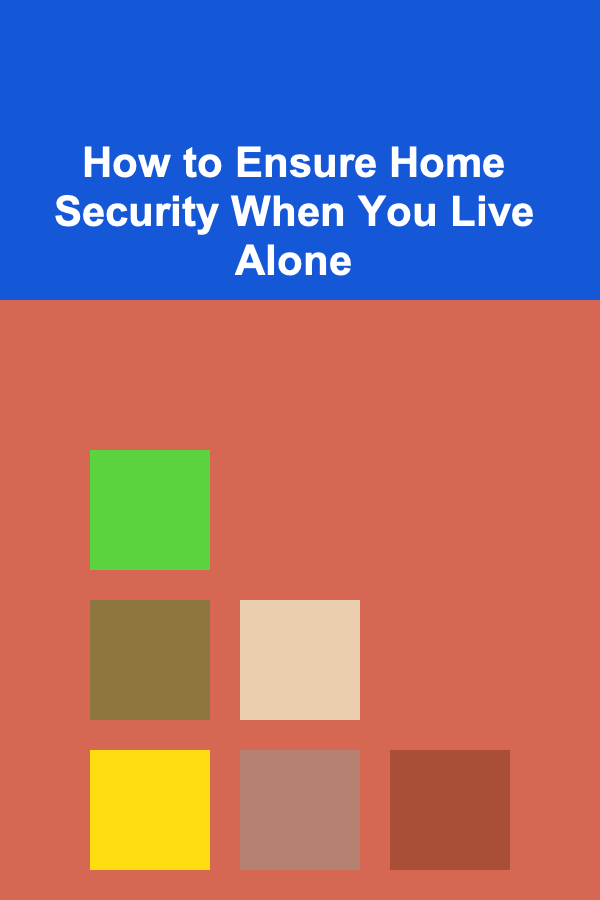
How to Ensure Home Security When You Live Alone
ebook include PDF & Audio bundle (Micro Guide)
$12.99$11.99
Limited Time Offer! Order within the next:

Living alone can provide a sense of independence and freedom, but it also comes with its own set of challenges---especially when it comes to home security. Whether you're a young professional, a student, or simply someone who enjoys solitary living, ensuring the safety of your home is paramount. Without anyone else to watch your back, it is essential to take extra steps to secure your living space and protect yourself from potential threats.
In this article, we will explore a comprehensive range of strategies to ensure home security when living alone. From simple precautions to advanced technological solutions, these measures can help safeguard your property and peace of mind.
The Importance of Home Security for People Who Live Alone
For individuals who live alone, home security becomes even more crucial. Without roommates, family members, or a significant other to keep an eye on things, the responsibility for security falls entirely on the individual. Not only is it about preventing break-ins, but it also extends to protecting yourself from potential intruders or emergencies. Living alone can make you more vulnerable to various security risks, including:
- Break-ins and thefts: Criminals may target homes that appear to be unoccupied or lacking in security measures.
- Personal safety: A solitary living arrangement could make it harder for you to get help in the event of an emergency.
- Emergencies and accidents: Living alone means you're responsible for managing your own safety, whether it's in case of fire, medical emergencies, or other accidents.
By taking proactive steps, you can significantly reduce the risks associated with living alone and create a safe and secure environment.
Enhance Physical Security
The first line of defense against intruders is the physical security of your home. It's essential to ensure that your home's entry points are secure and that you're not inadvertently making it easy for burglars to break in. Below are practical steps you can take to physically secure your home:
A. Secure Doors and Windows
- Deadbolt Locks: Ensure that your doors have sturdy deadbolt locks. A simple latch or knob lock can easily be picked or broken, while deadbolts offer a higher level of security.
- Reinforce Door Frames: Even the best locks can be ineffective if the door frame is weak. Consider reinforcing the frame with a metal strike plate to prevent forced entry.
- Use Peepholes or Smart Doorbell Cameras: A peephole allows you to safely see who's at the door without opening it. Alternatively, install a smart doorbell with a camera to get a live feed of the front door directly on your phone, even when you're not home.
- Secure Sliding Glass Doors: These doors can be easily bypassed by burglars unless they are properly secured. Install a metal or wooden rod in the track to prevent the door from being slid open.
B. Lock Windows
Windows are often a point of entry for burglars, especially on the ground floor. Make sure all windows are locked when you're at home or leaving the house. You can install additional locks or use security bars for added protection. Additionally, never leave windows open when you leave the house, even if you're just going out for a short time.
C. Install High-Quality Locks
Many burglars use tools to bypass weak or old locks. Invest in high-quality locks that are difficult to tamper with. Modern smart locks offer the added benefit of keyless entry, meaning you don't have to worry about losing a key or leaving a spare out in the open.
D. Install a Security Screen Door
In addition to regular doors, a security screen door can offer an added layer of protection. These doors are designed to be nearly impossible to break through, adding an extra level of security between you and any potential intruders.
Install a Home Security System
One of the most effective ways to ensure home security when living alone is to invest in a comprehensive home security system. These systems come with various features that can protect you from break-ins and give you peace of mind.
A. Choose a Home Security System with Monitoring
Many home security systems offer 24/7 professional monitoring, where a monitoring service watches your home and contacts the authorities if an alarm is triggered. This service ensures that even if you're away from home or unable to react, help will be on the way. Some systems offer both video surveillance and motion sensors that are activated when movement is detected.
B. Use Smart Security Cameras
Smart security cameras offer another level of protection by allowing you to monitor your property remotely. With features such as motion detection, night vision, and two-way audio, smart cameras can alert you to suspicious activity around your home. You can even interact with people at your door without opening it, making it an excellent deterrent for would-be burglars.
C. Install a Smart Alarm System
Along with cameras, a smart alarm system can provide an instant warning if an intruder attempts to break into your home. Many systems also allow you to control alarms, sensors, and cameras remotely via an app, giving you the flexibility to monitor your home from anywhere.
D. Use Motion-Activated Lights
In addition to a home security system, motion-activated lights can deter intruders. These lights automatically turn on when someone approaches your home, making it much harder for burglars to operate unnoticed. Motion-activated lights are particularly useful for driveways, walkways, and outdoor entry points.
Build a Strong Relationship with Your Neighbors
Having a good relationship with your neighbors can be one of the most effective ways to ensure home security. Neighbors can help keep an eye on your property when you're not home and alert you to any suspicious activity. Here are a few ways to foster a good relationship with those around you:
A. Start a Neighborhood Watch Program
If you live in a neighborhood with other solo dwellers, consider starting a neighborhood watch program. In these programs, residents work together to monitor unusual activity and keep each other informed of potential threats. A sense of community can be a powerful deterrent against crime.
B. Share Contact Information
Make sure your neighbors have your contact information in case of emergencies. In turn, you should be familiar with your neighbors' contact information so that you can reach out to them if needed.
C. Stay in Touch During Absences
If you plan to be away from home for an extended period, let your neighbors know. They can keep an eye on your property and ensure that your home remains safe while you're gone. It's also a good idea to ask them to collect your mail or packages to avoid indicating that you're not home.
Keep Your Home Well-Lit
One of the best deterrents for burglars is a well-lit home. When burglars are targeting a property, they often look for dark, hidden areas where they can break in without being seen. You can make your home less inviting by ensuring that all areas around your home, especially entry points, are well-lit.
A. Install Outdoor Lighting
Installing outdoor lighting around your yard, driveway, and porch can illuminate potential hiding spots and make it harder for intruders to move around unnoticed. Consider motion-activated lights for added effectiveness. These lights automatically turn on when they detect movement, which can surprise any would-be burglars.
B. Use Timers for Indoor Lights
If you're going to be away from home for a while, use timers to control your indoor lights. Setting up timers will give the impression that someone is home, which can dissuade burglars from attempting to break in.
Be Cautious with Social Media
While it may be tempting to share details about your daily life on social media, doing so can put your security at risk. Posting about your travels, vacations, or being home alone can give criminals the information they need to target your home.
A. Avoid Posting About Being Away
Never post in real-time when you're on vacation or when you're away from home for long periods. Criminals are known to monitor social media for such information. It's better to wait until after your trip to share pictures or updates.
B. Set Social Media Profiles to Private
Ensure that your social media profiles are set to private, limiting access to only trusted friends and family. Be mindful of what you post, and avoid sharing sensitive information like your address or phone number.
Keep Your Home Organized and Maintain a Routine
Being organized and maintaining a routine can help you recognize unusual activity and reduce the likelihood of accidents. Here are a few tips to stay organized:
A. Keep Doors and Windows Locked
Make it a habit to lock all doors and windows when you leave the house, even if you're just stepping out for a short time. It's easy to forget, but it's one of the most important things you can do to protect your home.
B. Establish a Safety Routine
Having a routine for when you come home or leave ensures that you're always aware of your surroundings. For example, when you come home, make sure all doors and windows are locked. Before you go to bed, check that all entry points are secure. This routine can help you feel more in control and prevent forgetfulness.
Conclusion
Living alone doesn't mean you have to sacrifice security. By implementing the right precautions, such as investing in high-quality locks, using smart security systems, building relationships with your neighbors, and maintaining a routine, you can greatly reduce the risk of a security breach. Taking the time to ensure your home is well-protected not only safeguards your property but also provides you with the peace of mind that allows you to enjoy the independence of living alone.
Reading More From Our Other Websites
- [Organization Tip 101] How to Organize Your Bathroom for a Spa-Like Experience
- [Personal Financial Planning 101] How to Build Wealth with Passive Income Streams
- [Personal Investment 101] How to Leverage Real Estate Investment Trusts (REITs) for Income
- [Organization Tip 101] How to Involve Kids in Seasonal Organization Projects
- [Home Budget 101] How to Budget for Child Expenses: Balancing Parenthood and Finances
- [Organization Tip 101] Step-by-Step Instructions for Basic Electrical Wiring Projects
- [Organization Tip 101] How to Use Cloud Storage Effectively for Your Virtual Workspace
- [Home Renovating 101] How to Renovate a Basement into a Cozy Living Area
- [Personal Care Tips 101] How to Use Blush to Brighten Dark Skin Tones
- [Stamp Making Tip 101] From Kids' Projects to Professional Branding: Versatile Stamp Ideas for Every Skill Level

How to Build a Succession Plan for Your Team
Read More
How to Create a Vintage Craft Supplies System
Read More
How to Manage Multiple Properties Without Losing Control
Read More
How To Plan for Healthcare in Early Retirement
Read More
How to Develop VR for Fashion Design
Read More
How to Prepare for College Application Interviews: A Checklist
Read MoreOther Products

How to Build a Succession Plan for Your Team
Read More
How to Create a Vintage Craft Supplies System
Read More
How to Manage Multiple Properties Without Losing Control
Read More
How To Plan for Healthcare in Early Retirement
Read More
How to Develop VR for Fashion Design
Read More